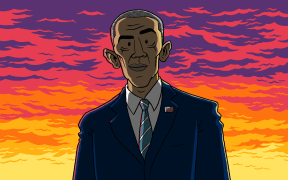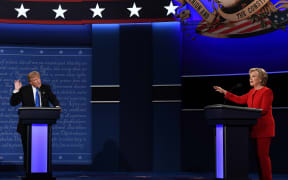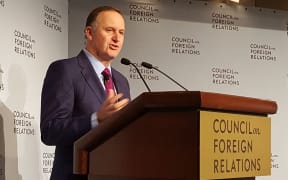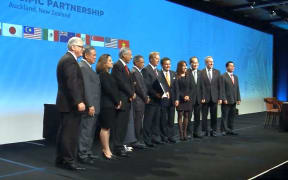Analysis - Talking about trade is something Tim Groser likes to do, given it has consumed a large part of his working life as a trade negotiator and then a key player as a trade minister in the 12-nation Trans-Pacific Partnership talks.
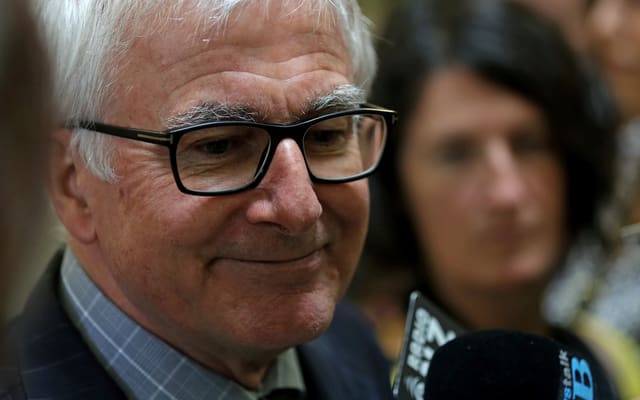
Former Trade Minister Tim Groser is now New Zealand's ambassador to the United States. Photo: RNZ / Alexander Robertson
But the ambassador to the United States is uncharacteristically reluctant to talk at first about the chances of Trans-Pacific Partnership (TPP) being passed by American politicians in the so-called lame duck session, a 12-day period that takes place after the presidential election next month.
Mr Groser said he did not want to step on the toes of his successor, Todd McClay.
"It's a point of principle. There's nothing more annoying than hearing ex-politicians mouth on."
But the precarious future of the TPP in the US is a topic the former trade minister quickly warms to.
"It's not like we [NZ] are in trouble if the TPP doesn't pass. We'll be okay. But it will be an opportunity lost."
In the US, the hurdles appeared formidable. The two main presidential candidates, Donald Trump and Hillary Clinton, were both opposing it and influential, pro-trade Republicans in Congress were downplaying the chances of the trade pact being passed this year.
Senate majority leader Mitch McConnell has said the TPP would not get a Senate vote this year, and House of Representatives Speaker Paul Ryan has said he does not see enough votes for it to pass.
Despite some commentators claiming TPP is dead, Mr Groser is not one of them.
"They [McConnell and Ryan] have explicitly said that [ they've ruled out TPP], and we'll wait and see what position they take after the election."
"We have to be conscious that trade debate in this country from our perspective has gone off the reservation, and very unambiguous statements have been made, which you have to interpret against that political background."
"What they might do after the election we will wait and see. And anyone who thinks they know precisely what's happened is seriously badly informed," Mr Groser said.
US president Barack Obama has staked his legacy on TPP, and Mr Groser said "there's not even a 0.1 percent doubt" Mr Obama's administration would submit the TPP text to Congress next month.
Mr Obama has warned the US risks letting China write the trade rules for the 21st century.
Mr Groser said that was well understood by American lawmakers. He believed it would be a key argument to convince American politicians to support the trade pact after November's elections.
"They must understand strategically the pivot to Asia, given the huge shift in power to Asia in the 21st century, has to have an economic component to it. And if the United States wants to tuck itself up in bed and not be part of that deal [TPP], then others will move ahead without it."
Mr Groser echoed Prime Minister John Key in arguing the US is in danger of being left behind if it doesn't back the TPP.
"We are not going to stay in a political hole with them. Not because we are pleased about that. Quite the contrary, but we will move ahead with others, and China is the significant other."
New Zealand is also involved in a China-led trade deal, the Regional Comprehensive Economic Partnership (RCEP).
But RCEP is not the government's preferred trade deal, given its relatively modest goals in opening up trade.
Mr Groser is adamant the TPP is "absolutely" the best deal available, despite his own misgivings about the dairy outcome.
Some argue a new trade framework is needed.
The focus of new trade agreements is less about tariffs, which are low overall, and more about stripping away barriers behind the borders, as well as harmonising investment, labour and environmental standards between countries.
But that raised public suspicion that deals such as TPP suit corporates, not workers or consumers.
Mr Groser conceded the rise of Mr Trump in the US and the Brexit outcome meant questions about trade policy would arise.
But he was not convinced the current model was irreparably broken.
"The existing framework, underpinned by the multilateral trading system, and seven or eight successful negotiating rounds ending with the Uruguay round have created a framework which has allowed hundreds of millions of people to be lifted out of poverty. It has established a dispute settlement process that works extremely well."
"So one would be very, very cautious about going along with some simple minded conclusion we have to reinvent everything."
"This has been a huge engine of growth and development in the last 50 to 70 years, and we have to be open to different ways, but let's not go to far down that track."

